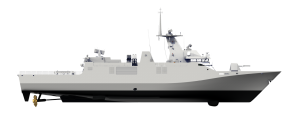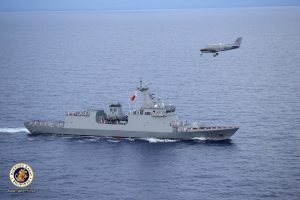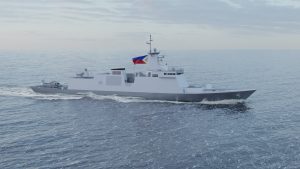SHAH ALAM: In a previous post, Malaysian Defence wrote about the 11 new ships the Philippines Navy is buying. Among the 11 ships are six OPVs which it is buying from South Korea.
On June 27, the Philippine government signed a contract with South Korean shipbuilder, Hyundai Heavy Industries (HHI) to construct six units of new build 2,400 ton Offshore Patrol Vessels (OPV) costing US$573 million or RM2.5 billion.


According to a HHI release:
The Philippine Navy OPV has a displacement of 2,400 tons, a length of 94.4 meters, a width of 14.3 meters, a maximum speed of 22 knots, a cruising speed of 15 knots, a range of 5,500 nautical miles and will be built at HHI’s Ulsan shipyard until 2028. The vessel is to be equipped with a 76mm main gun, two 30mm secondary guns, a helideck capable of operating a helicopter and unmanned aerial vehicles


From the above and the CGI of the ship, the OPV is basically similar to the requirements of the RMN’s LMS Batch II. It is not equipped with surface to surface missiles and a 3D radar though from the CGI it is equipped with twin VSHORAD launchers.


It must be noted that in late 2021, HHI also signed a contract with the Philippines to build two missile-armed corvette for US$547 million or MR2.4 billion. The two corvettes are 116 meters in length and 14.8 meters in width, with a displacement of 3,200 tonnes. They will be able to achieve a maximum speed of 25 knots with a travel range of 4,500 nautical miles. These ships are similar to the Jose Rizal class frigates (pictured above) – two already in service but slightly smaller.


It is likely that HHI could tweak the design to accommodate twin SSM launchers and other needs of the RMN for the LMS Batch II. That said it appears that HHI and its local agent were completely in the dark about the LMS Batch II as it came to the DSA 2022 promoting its MRSS option. Or perhaps it was thinking it had no chance for the smaller ship programme and decided that the MRSS was a better deal to pursue.
— Malaysian Defence
.
If you like this post, buy me an espresso. Paypal Payment

View Comments (19)
Admin can I ask...is Malaysia deal with supplier direct Govt to Govt (like Philippines) or have a middleman in purchasing military equipment for Malaysia.?
Middlemen
I see thats why Malaysian Military Equipment are more expensive...If there is a Middlemen corruption may take place unlike in Govt to Govt...there is no or less Corruprion at all...Middlemen get rich...
I think Secretary Lorenzena is the reason for that in the Philippines. Let's hope the new Defence Secretary, a former COS as well, continues the practice
jun - ''If there is a Middlemen corruption''
Not ''corruption'' per see but mark ups. They have to make a profit for the services rendered and that's what drives prices up [my stance on this and the policy which enables it has been made very clear]. ''Corruption'' does happen but in different ways; we are talking about markups here. Not only does mark ups drive up the prices of things but the if/when local agents go bust it has a ripple effect.
Does not mean that G2G will not have corruption issue nor will meet exactly what the end user really wanted.
The best way is to have a blind procurement process whereby the end user specify in detail the requirements and the performance envelope of their needs but not the thing or the make itself to remove any preferences, and the Government will have an open tender process for the prospects to bid according to the specs given. The ones that meet all or as many the requirements and acceptable by the end user will be selected and parred down thru further evaluations, eventually only the most suited bid will win. This way it is a win-win-win for all as the end user gets what they want, the Government will get their money's worth, and the bidders will have transparency on their bidding chances.
Read my previous stories on LMS Batch 1 and 2
Rm2.5 billion for six ships sound like a good deal..The question is, are them good enough for RMN's LMS batch 2 requirement or are they want something bigger.?
I believed HHI did promoted their design for LMS batch 2 requirement during recent DSA..Based on Jose Rizal Class with the tonnage of 1500 tonnes..
https://youtu.be/X5Bb1g0PXNk
We need to implement the Political Funding Act to minimise corruption.
Secondly, there is no such thing as open tender unless the product is a commodity. Each defence product is significantly different. You just need to lobby that your specs is the one tendered out. Just a single item that others can’t comply is good enough.
Moreover, the users themselves have their own set of requirements. Tendering out generic requirements would dilute so much those specific specs unique to certain bleeding edge product.
Joe - ''Does not mean that G2G will not have corruption issue nor will meet exactly what the end user really wanted.''
Only a catastrophic thermonuclear war which results in the end of humanity as we know it will totally eradicate corruption...
The point is that appointing local companies to act as the facilitator for certain deals drives prices up and it doesn't really lead to any tangible benefits in the long run. On paper the whole idea of doing so is that local companies can get certain types of knowledge that will eventually benefit the industry/nation. In reality; with a few exceptions; local companies don't provide any added value or justify they revenue they've earned. Until or unless the defence policy undergoes a fundamental revamp the end user will not get the desired capability at the right price or in the needed quantities and the taxpayer won't get her/his cash's worth and we'll remain stuck in the rut we're in.
With the Philippines it's different; there's an acute realisation that after decades of neglect the PN badly needs modernising and that was the priority; not benefiting the local industry or other forms of national interests.